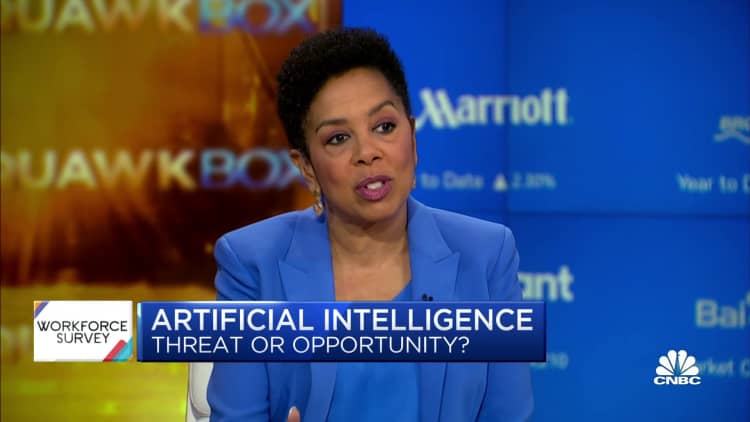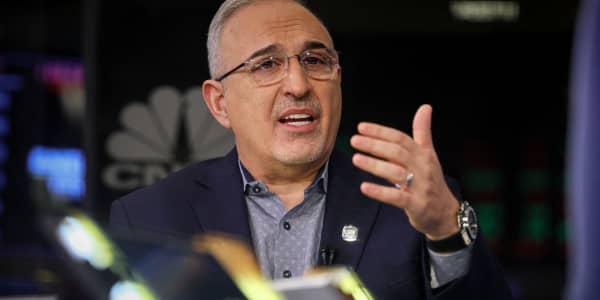The debut of ChatGPT has sparked new fears that artificial intelligence will replace the work that people do much sooner than anyone thought, making workers redundant or even making entire job functions obsolete. Why pay a human to do something that an algorithm could do for free?
Workers who are already using AI for their jobs provide an impressive counterpoint to this narrative, because they are, in short, thriving. They are more likely to have received recent salary increases that have outpaced inflation, to consider themselves very well paid, to say they have opportunities to advance their careers, and to say morale at their company is high. For these early AI adopters, AI is a boon to their careers rather than a threat.
According to the latest CNBC|SurveyMonkey Workforce Survey, workers who say they rely on AI for their jobs have a Workforce Happiness Index of 78, seven points higher than among those who don't use AI at all at their jobs (71).
That difference between the early AI adopters and the holdouts is larger than the differences we see in workforce happiness by race (at most a one point difference), education (at most a three point difference), or whether someone works fully in-person or fully remotely or something in-between (at most a two point difference).

This Workforce Happiness Index calculates a score for every survey respondent in our CNBC|SurveyMonkey Workforce Survey, with a maximum of 100 and a minimum of 0. Over the 10 surveys we have fielded since April 2019, the overall index score has varied shockingly little, with scores only ranging from 71 to 73 in each wave. These latest data from the May 2023 survey was fielded among nearly 9,000 workers in the U.S. from May 23-31.
On every measure that comprises our Workforce Happiness Index — including pay, autonomy, opportunities to advance, recognition for their work, and meaningfulness — workers who use AI for their jobs report satisfaction that is greater than or equal to their peers. For example, 38% of workers who say using AI is necessary for them at work also say they are very well paid, compared with 24% among those who don't use AI at all at their job. Similarly, 44% of workers who use AI for their jobs say they have excellent opportunities to advance their careers at their company, compared with just 24% among those who do not use AI at work.
AI, salary gains and inflation
Aside from those core components of happiness at work, the divide between AI-enabled workers and luddites shows up in other ways. Compared with those who don't use AI at all, workers who say using AI is necessary to do their job are more likely to say their salary has increased more than inflation in the past year (33% vs. 10%) and to rate morale at their workplace as excellent (50% vs. 27%).
Why might that be? Over the past few years, inflation has increased exponentially, and a common complaint among workers is that their salaries have not kept pace. A large part of the appeal of the Great Resignation was that workers could leave their low-paying job for a similar job that would pay them a (significantly higher) market rate salary elsewhere.
In our latest Workforce Survey, 65% of workers say that inflation has increased more than their salary has increased in the past 12 months, while 21% say their salary and inflation have risen in tandem and just 12% say their salary has increased more than inflation. Workers who rely on AI to do their jobs are three times as likely as those who do not use AI for work to fall into that lucky last category, but it might not just be by luck.
Early adopters of AI in the workplace are a more diverse bunch than you might expect. The group of workers who say AI is required to do their job tend to be younger than workers on average (42% are under age 35, compared with 34% of workers overall). But, they are less likely to be white (39%, compared with 63% of workers overall) and no more likely than other workers to have incomes in the six figures.
They are more highly concentrated in some industries than others. More than one in five workers (21%) in advertising & marketing say "using AI is necessary to do my job," making it the field with the highest percentage of its workers who are already incorporating AI into their day-to-day jobs. Following closely behind, 18% of workers in business support & logistics, 15% of workers in agriculture, 14% of workers in hospitality and tourism, 12% of workers in the automotive industry, and 12% of workers in technology say AI is required for them to do their job.
Still, even if more satisfied in jobs now, the data suggests early adoption of AI can lead to a higher level of fear about the future. About half of workers in advertising & marketing and business support and logistics (46%) are worried AI will soon take their job – twice the level of concern overall.
Noteworthy, though, is that technology and advertising & marketing are the fields with the fewest workers who say they don't use AI at all (42% and 33%, respectively), indicating that most tech workers are making use of AI by choice rather than requirement.
That might be a key reason these early adopters are thriving – they are doing so as much by choice as by necessity. Their early use of AI might have shown them how much more productive and successful they can be by relying on these new tools, and they simply have no choice but to embrace that future.
To join the CNBC Workforce Executive Council, apply at cnbccouncils.com/wec.







